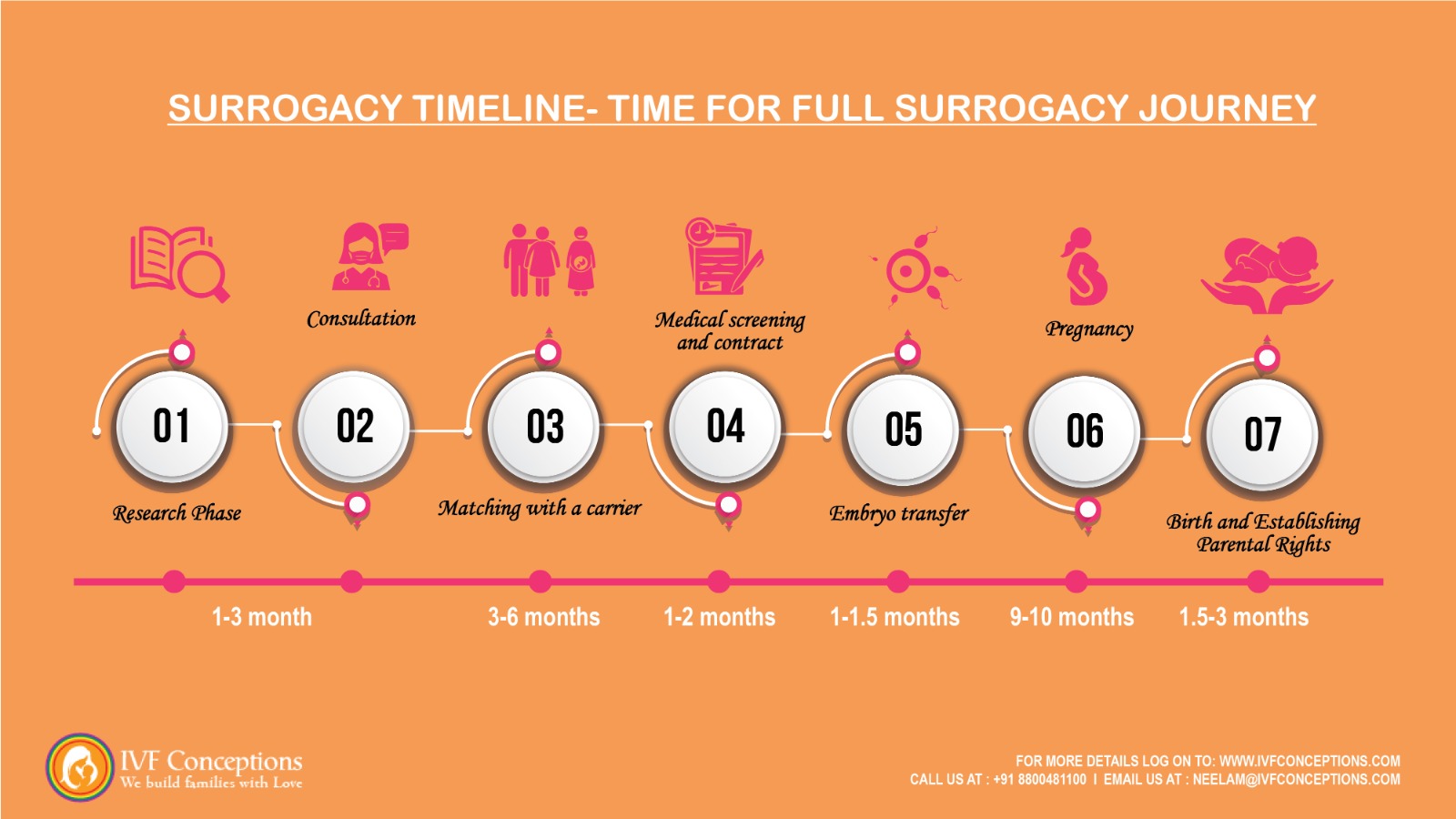Is Commercial Surrogacy Allowed in India? An In-Depth Look at Surrogacy Laws in India
No, commercial surrogacy is not allowed in India as per Surrogacy Regulation Act 2021. Surrogacy is a complex, emotional, and increasingly popular reproductive option for couples and individuals who are unable to conceive naturally.
While India has long been a destination for surrogacy due to its affordable costs and well-established medical infrastructure, the legal landscape around surrogacy in India has been undergoing significant changes in recent years.
- Book an online appointment: Get a free online consultation.
- Call\W:+91-8800481100 Email:neelam@ivfconceptions.com
This blog post will dive deep into the topic of surrogacy in India, focusing on commercial surrogacy in India, its legal status, and the current status of surrogacy laws in India.
More Resources to Read:
Surrogacy Twins Cost: What to Expect
Disqualifications for Surrogacy For Surrogates: Key Factors
Cost of Surrogate Mother in India: A Complete Guide
Surrogates and Abortion: What to Know Before This Journey
When was commercial surrogacy banned in India?
Commercial surrogacy was banned in India since 2021 December once THE SURROGACY (REGULATION) ACT, 2021 was implemented.
What is Surrogacy?
Surrogacy is a reproductive arrangement where a woman (the surrogate) carries and delivers a child for another person or couple (the intended parents). Surrogacy can be classified into two main types:
- Gestational Surrogacy: The surrogate mother carries an embryo created through IVF, and the child is not genetically related to her.
- Traditional Surrogacy: The surrogate is inseminated with the sperm of the intended father or a donor, making her the biological mother of the child.
The surrogacy process involves several steps, including medical screening, legal contracts, and often, in-vitro fertilization (IVF).
THE SURROGACY (REGULATION) ACT, 2021
- Altruistic Surrogacy only (no direct financial benefit to the surrogate mother)
- Registered Surrogacy Clinic only (ART Registered clinics can perform surrogacy).
- Single woman (divorced or widowed), between the age of 35 to 45 years. A genetic link is a must.
- Married Indian female (25 to 50 years) and male (26 to 55 years).
- Only Indian citizens and OCI are allowed to do surrogacy ( married couples)
- Couple have not had any healthy surviving child biologically or by adoption.
- Have to have Medical indication necessitating gestation surrogacy.
- To obtain a certificate of essentiality from The Appropriate Authority.
- To obtain certificate of medical indication necessitating gestation surrogacy from District Medical Board.
- Parentage Order passed by First class Magistrate.
- Surrogate Mother to obtain eligibility certificate from The Appropriate Authority.
- Surrogacy (Regulation) Amendment Rules, 2024- As of 21st Feb 2024, it is possible to use an egg donor or sperm donor if all other conditions are met.
Surrogacy Laws in India
India has a long history of surrogacy services, especially gestational surrogacy. However, commercial surrogacy in India has been a subject of legal and ethical debate for years. Let’s explore the main aspects of surrogacy law in India:

Is Surrogacy Legal in India?
Yes, surrogacy in India has been legal for many years, but it has gone through various regulatory changes, especially concerning commercial surrogacy in India. The Indian government has implemented rules and regulations to address concerns over exploitation and to protect the rights of the surrogate mother and the child.
Commercial Surrogacy Banned in India
As of 2015, the Indian government introduced regulations to prohibit commercial surrogacy in India. These rules were part of the Surrogacy (Regulation) Bill 2016, which aimed to curb the growing industry of surrogacy and make the process more ethical and transparent. This bill has undergone several amendments, and as of 2024, commercial surrogacy remains banned in India.
Key Provisions Under the Surrogacy Law in India:
- Altruistic Surrogacy: Only altruistic surrogacy is allowed, meaning that surrogates cannot receive financial compensation beyond medical expenses and basic living costs.
- Eligibility for Surrogacy: The surrogacy rules in India state that only married couples who have been married for at least five years and are unable to conceive naturally are eligible to pursue surrogacy.
- Age Limit for Surrogacy in India: The surrogate mother age limit is 25-35 years. Surrogates must also be healthy and have already had at least one child of their own.
- Single Parents and Same-Sex Couples: Surrogacy for single men, women, or same-sex couples is not allowed under the current surrogacy laws in India. Only married heterosexual couples can legally opt for surrogacy.
Surrogacy Law in India 2025
In 2024, the Surrogacy (Regulation) Act 2021 and its amendments continue to dictate the surrogacy process in India. The Act lays out the legal framework for surrogacy, emphasizing altruistic surrogacy and tightening eligibility requirements. Commercial surrogacy remains prohibited.
Who Can Opt for Surrogacy in India?
According to the surrogacy rules in India 2024, the following individuals can opt for surrogacy:
- Married Couples: Couples who have been married for at least five years and are unable to conceive due to medical conditions.
- Indian Citizens: Only Indian citizens are eligible to pursue surrogacy in India. Foreigners, including NRIs and people of Indian origin, are not allowed to commission surrogates in India under the current surrogacy laws.
Legal Procedure for Surrogacy in India
The legal procedure for surrogacy in India involves several steps:
- Medical Evaluation: The intended parents and the surrogate mother undergo thorough medical evaluations.
- Psychological Counseling: Both the surrogate and the intended parents must undergo psychological counseling to ensure that they understand the emotional aspects of the process.
- Legal Contract: A surrogacy agreement is signed, detailing the rights and responsibilities of all parties involved, including compensation, if applicable, and the custody of the child after birth.
- Embryo Transfer: The process of IVF and embryo transfer is carried out, with the surrogate carrying the embryo created from the intended parents’ gametes or donated gametes.

Surrogacy Cost in India
One of the major reasons India became a hub for international surrogacy was its affordable surrogacy costs. However, with the ban on commercial surrogacy in India, the cost has risen as it is now primarily altruistic surrogacy.
The cost of surrogacy in India typically includes medical fees, surrogate mother compensation (within the legal limits), and legal expenses.
On average, the surrogacy cost in India can range from 20L to 30L INR (approximately) though the price can vary depending on the clinic, the complexity of the case, and other factors.
Surrogate Mother’s Rights in India
Under Indian surrogacy law, surrogate mothers are entitled to certain rights and protections:
- Medical Care: Surrogate mothers are entitled to medical care and expenses covered during the pregnancy.
- Compensation: Surrogates can only receive compensation for medical expenses and basic living costs, as commercial surrogacy is banned.
- Post-Birth Rights: The surrogate mother cannot claim custody of the child. After the birth, the intended parents are considered the legal parents.
The Future of Surrogacy in India
With the introduction of the Surrogacy (Regulation) Act 2021, surrogacy in India 2024 is highly regulated, focusing on altruistic surrogacy to protect the rights of both the surrogate and the child. While commercial surrogacy in India is prohibited, the country remains a popular destination for altruistic surrogacy among Indian couples.
Is surrogacy legal in India? Yes, but only in the form of altruistic surrogacy. As for commercial surrogacy? It is banned.
More Resources to Read:
Surrogacy Process Explained for Intended Parents
How Long Does the Surrogacy Process Take?
Top 5 Things To Know Before Going For Surrogacy Process
Finding the Best IVF Clinic in India: Expert Guide
Conclusion
So, to conclude commercial surrogacy in India is not allowed anymore. Surrogacy in India has seen significant regulatory changes over the past few years, particularly with the ban on commercial surrogacy and the shift towards altruistic surrogacy. While the practice remains legal in India, it is subject to strict guidelines to ensure ethical practices and protect the rights of all parties involved.
If you are considering surrogacy in India, it’s crucial to understand the legal process, the surrogacy eligibility criteria, and the cost of surrogacy in India. Always consult with a knowledgeable surrogacy consultant to navigate the complexities of the surrogacy law in India.
By following these guidelines, you can help ensure that the surrogacy journey in India is smooth, ethical, and legally compliant.
We are leading International Surrogacy Industry Expert with more than 15 years of global experience and expertise. Get in touch with us about affordable, reliable, and legal surrogacy options.
If you’d like to learn more about IVF, Egg Donation, or surrogacy services globally, check out the rest of our website at Georgia Surrogacy Agency. We offer legally secure and affordable surrogacy consulting services for FREE.
Get in touch for FREE SURROGACY CONSULTING:
Mobile: +91-8800481100 ( WhatsApp, Line, Viber)
Email: neelam@ivfconceptions.com

Why Choose us for your smooth and successful surrogacy journey!!
- Option of choosing multiple surrogacy destinations with 14+ Years of international surrogacy experience.
- Getting a chance to work with fertility clinics/agencies that are elite and have proven track record with reference from existing IPs.
- Option of choosing multiple egg donor options- Asian, Caucasian, African, Oriental etc.
- All transparent financial transactions with affordability. You make direct payment with no additional fee on top.
- No hidden agent fee or surprise cost later on. All fees paid directly as per the agreement signed with service provider.
- Dedicated case manager to each IPs.
- Honest, transparent and quick communications.
- Assistance in all legal matters pertaining to visa and taking baby home process.
- Local support with access to all medical reports of egg donors and surrogate mothers.
- Assistance in all logistics of frozen sperms/embryos shipments.
- Last but not least, we have years of experience in coordinating delicate surrogacy programs with great personal care.
FAQs on Surrogacy in India
-
- Is surrogacy legal in India?
Yes, surrogacy is legal in India, but only altruistic surrogacy is permitted under the Surrogacy (Regulation) Act, 2021. - What are the current surrogacy laws in India?
The Surrogacy (Regulation) Act, 2021, bans commercial surrogacy and permits altruistic surrogacy for eligible Indian couples facing infertility. - What is altruistic surrogacy in India?
Altruistic surrogacy involves no financial compensation to the surrogate beyond medical expenses and insurance. - Who can opt for surrogacy in India?
Only Indian heterosexual married couples with proven infertility and meeting specific age criteria can pursue surrogacy. - Is commercial surrogacy allowed in India?
No, commercial surrogacy has been banned in India since 2021. - What is the age limit for surrogacy in India?
The female partner must be between 23–50 years, and the male partner must be between 26–55 years to qualify for surrogacy. - What is the legal procedure for surrogacy in India?
The legal process involves obtaining medical infertility certification, approval from the appropriate authority, and meeting eligibility criteria under the Surrogacy Act. - How much does surrogacy cost in India?
Since only altruistic surrogacy is allowed, the costs typically include medical expenses, surrogate care, and insurance, averaging ₹10–₹15 lakh. - Is surrogacy banned in India?
Commercial surrogacy is banned, but altruistic surrogacy remains legal for eligible Indian couples. - What is the Surrogacy Regulation Act 2021?
This act regulates surrogacy in India, banning commercial surrogacy and allowing only altruistic surrogacy under strict eligibility rules. - Are foreigners allowed to pursue surrogacy in India?
No, foreigners, OCI/PIO holders, and NRIs cannot undertake surrogacy in India. - What are the new surrogacy rules in India for 2024?
The latest rules continue to uphold the ban on commercial surrogacy and emphasize stricter eligibility and approval processes. - Is altruistic surrogacy legal in India?
Yes, altruistic surrogacy is legal and regulated under Indian law. - What is the role of a surrogate mother in India?
A surrogate mother must be a close relative, married, and have at least one child of her own. She receives no payment apart from medical and insurance coverage. - What are the rights of a surrogate mother in India?
Surrogate mothers are entitled to medical care, insurance, and protection under the Surrogacy Act, but they cannot claim parentage rights. - What is the cost of altruistic surrogacy in India?
The cost covers medical treatment, care for the surrogate, and insurance, typically between ₹20–₹25 lakh. - Is surrogacy legal in India for single parents or same-sex couples?
No, surrogacy in India is only allowed for heterosexual married couples. - What does surrogacy mean in India?
Surrogacy involves a woman carrying a child for another couple, but only altruistic surrogacy is legal in India under strict guidelines. - What are the conditions for surrogacy in India?
Intended parents must be married for at least five years, prove infertility, and meet age and other legal requirements. - What is the current status of surrogacy laws in India for 2024?
Surrogacy laws in India remain unchanged, permitting only altruistic surrogacy with strict regulations to prevent misuse.
- Is surrogacy legal in India?
- Is commercial surrogacy banned in India?
Yes, commercia surrogacy is banned in India since early 2022.
- Why commercial surrogacy is banned in India?
It is banned due to the new surrogacy regulation act 2021, which state that commercial surrogacy will not be allowed as it lead to exploitation of the surrogate mother.

Highly esteemed, authoritative, and trusted professional with a 14-year of experience in international surrogacy. Advocate for Secure, Legal, and Affordable International Surrogacy.
Neelam Chhagani, MA (Counselling Psychology) and Holistic Infertility and Third-Party Reproduction Consultant.
Member of European Fertility Society, Best Surrogacy Blogger of 2020, with 300 dedicated blogs, and top contributor on Quora for Surrogacy.


Add Your Comment